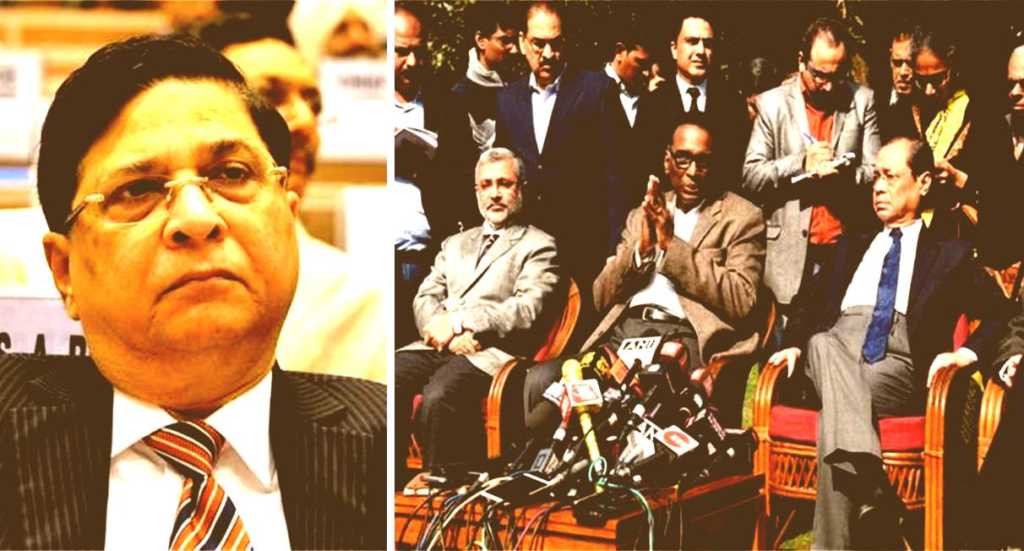12th January 2018 was a historic day in the annals of the history of India’s judiciary. On that day, 4 senior-most Judges of the Supreme Court of India held a press conference bringing out in public domain certain issues with the working of the Apex Institution i.e. SC. The Hon’ble Judges even presented a letter, which they had written to the Chief Justice of India Dipak Misra complaining of the same. The said letter primarily deals with an emphasis (and in a way serving as a reminder to the Chief Justice of India) on conventions and principles of the SC.
The letter also focuses on other things such as urging the Chief Justice of India to follow the convention in deciding the roster while acknowledging his authority to decide the same. In fact, it would not be incorrect to say that the primary issue raised by the Hon’ble Judges in their letter relates to the Memorandum of Procedure for Appointment of Judges and Chief Justices to the Higher Judiciary.
The genesis of the present Memorandum itself lies in the Third Judges case of 1998, consequent to which the said Memorandum of Procedure was drawn by the Ministry of Law & Justice in 1999. On 27th October, 2017, a 2-Judge bench of the Supreme Court issued notice to the Centre on the finalization of the new Memorandum of Procedure (which had been finalized after exhaustive consultations and sent to the Centre in March 2017), thereby treating the matter on the judicial side. The Hon’ble Judges also pointed out that if the matter had to be heard on the judicial side then it ought to have been heard by a Constitution bench.
The Chief Justice of India Dipak Misra has so far maintained silence on the subject. There have been calls by many eminent members of the legal fraternity, including former Judges of the Supreme Court, to resolve the matter internally.
But looks like the deadlock has been resolved. The four judges — Justices J Chelameswar, Ranjan Gogoi, Madan B Lokur and Kurian Joseph — took up their respective business on the first working day of the Supreme court after the January 12 Press Conference. Attorney General K K Venugopal has even said that “everything has been settled” thereby suggesting that the matter has been resolved. Similar view was echoed by the Chairman of the Bar Council of India, Manan Kumar Mishra. “We met 15 SC judges, and all have assured that issues have been resolved. Political parties should not try and take mileage from the incident,” PTI quoted Mishra as saying.
But, as is wont nowadays, it appears that political parties, especially those in the opposition, have tried to take political mileage from an issue that at best can be described as an internal administrative matter between the judiciary and the executive. On the day of the press conference itself, senior CPI leader D Raja met the second senior most Judge Justice J Chelameswar. Once the issue escalated, the CPI distanced itself from D Raja’s meeting the with senior Judge of the Supreme Court. Congress President Rahul Gandhi jumped into the picture when he addressed a press conference on the evening of 12th January and said, “They (the judges) mentioned that there is a threat to democracy. It needs to be looked into carefully”. Bar Council of India categorically asked Rahul Gandhi not to politicize the matter.
The reservations expressed by the 4 Supreme Court Judges about certain issues concerning the functioning of the apex institution of the judiciary seem to have been deliberately intertwined with other unconnected issues such as the petition filed before the Supreme Court seeking a probe into the death of CBI Special Judge B H Loya by the opposition parties such as the Congress in order to corner the Central Government and derive political benefit. By trying to make it a political issue and undermining the credibility of the Supreme Court for its own political gains, the opposition has done great disservice to the nation and to its citizens. Lawyer Dushyant Dave who is also part of the panel of lawyers of the Congress Government of Punjab even made the preposterous claim that the Supreme Court Judge Arun Mishra (before whose bench the matter of Judge B H Loya’s death has been listed) is close to the BJP leadership.
It was reported in a section of the media that when the Supreme Court Judges met for the morning tea session at the Judges’ lounge to settle the issues, Justice Arun Mishra nearly broke down and said that it was unfair to question his “competence” and “integrity”. It was a nice gesture by Chief Justice of India Justice Dipak Misra and the second senior most Judge Justice J Chelameswar (who had also spoken on 12th January during the press conference) to come together to “comfort” Justice Arun Mishra and assuage his feelings. It is this approach of communicating among each other on important issues to sort them out and of fraternal bonding among the men entrusted with dispensing justice at the highest level of Indian judiciary that should hopefully see the institution tide over such problems even in the time to come.
